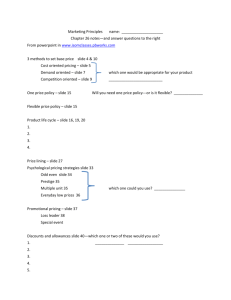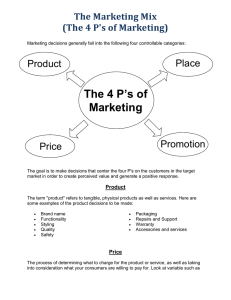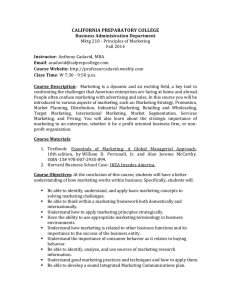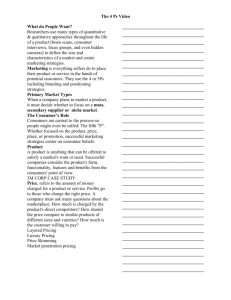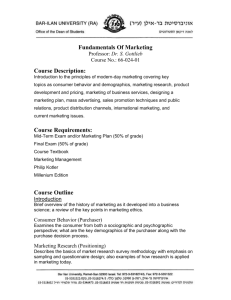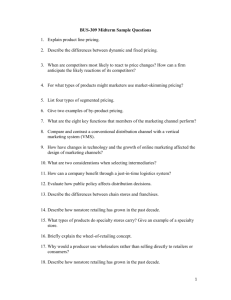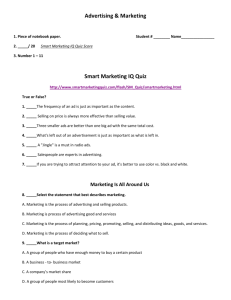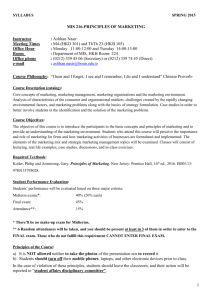Table of Contents: I. Department of Marketing Operational Philosophy & Unique Significant Difference
advertisement
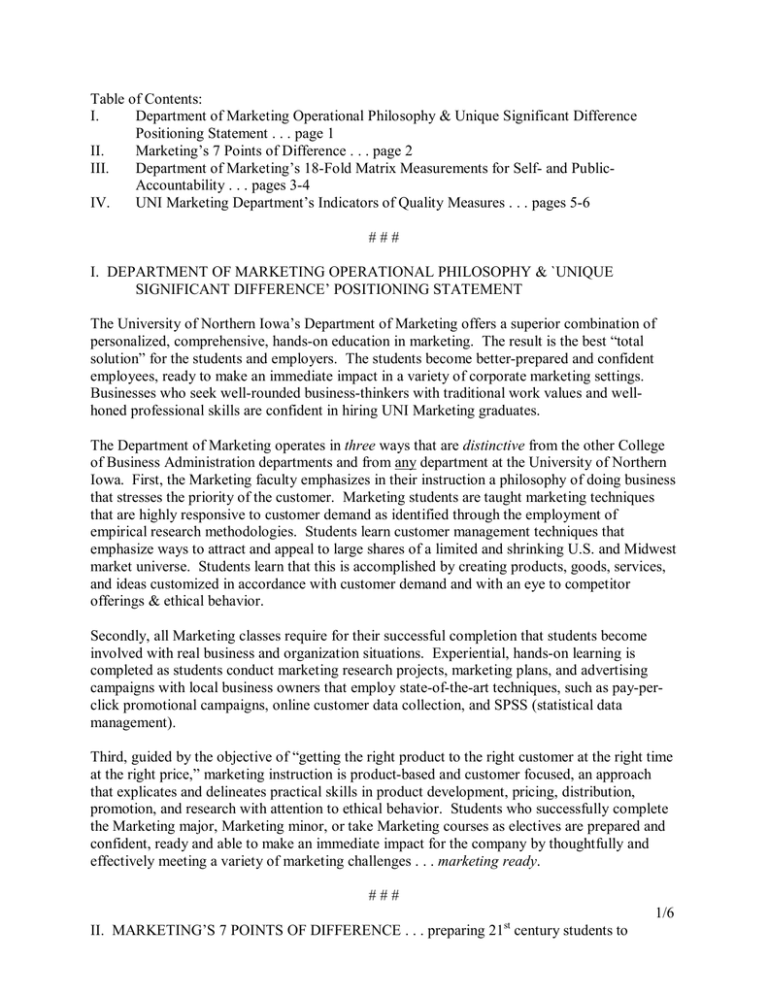
Table of Contents: I. Department of Marketing Operational Philosophy & Unique Significant Difference Positioning Statement . . . page 1 II. Marketing’s 7 Points of Difference . . . page 2 III. Department of Marketing’s 18­Fold Matrix Measurements for Self­ and Public­ Accountability . . . pages 3­4 IV. UNI Marketing Department’s Indicators of Quality Measures . . . pages 5­6 # # # I. DEPARTMENT OF MARKETING OPERATIONAL PHILOSOPHY & `UNIQUE SIGNIFICANT DIFFERENCE’ POSITIONING STATEMENT The University of Northern Iowa’s Department of Marketing offers a superior combination of personalized, comprehensive, hands­on education in marketing. The result is the best “total solution” for the students and employers. The students become better­prepared and confident employees, ready to make an immediate impact in a variety of corporate marketing settings. Businesses who seek well­rounded business­thinkers with traditional work values and well­ honed professional skills are confident in hiring UNI Marketing graduates. The Department of Marketing operates in three ways that are distinctive from the other College of Business Administration departments and from any department at the University of Northern Iowa. First, the Marketing faculty emphasizes in their instruction a philosophy of doing business that stresses the priority of the customer. Marketing students are taught marketing techniques that are highly responsive to customer demand as identified through the employment of empirical research methodologies. Students learn customer management techniques that emphasize ways to attract and appeal to large shares of a limited and shrinking U.S. and Midwest market universe. Students learn that this is accomplished by creating products, goods, services, and ideas customized in accordance with customer demand and with an eye to competitor offerings & ethical behavior. Secondly, all Marketing classes require for their successful completion that students become involved with real business and organization situations. Experiential, hands­on learning is completed as students conduct marketing research projects, marketing plans, and advertising campaigns with local business owners that employ state­of­the­art techniques, such as pay­per­ click promotional campaigns, online customer data collection, and SPSS (statistical data management). Third, guided by the objective of “getting the right product to the right customer at the right time at the right price,” marketing instruction is product­based and customer focused, an approach that explicates and delineates practical skills in product development, pricing, distribution, promotion, and research with attention to ethical behavior. Students who successfully complete the Marketing major, Marketing minor, or take Marketing courses as electives are prepared and confident, ready and able to make an immediate impact for the company by thoughtfully and effectively meeting a variety of marketing challenges . . . marketing ready. # # # 1/6 st II. MARKETING’S 7 POINTS OF DIFFERENCE . . . preparing 21 century students to become marketing ready: 1) Experiential hands­on educational learning activities . . . guaranteed one class (Marketing Research) for all Marketing majors where students will work with a live corporate client to solve a business problem and up to five experiential learning­oriented classes depending upon their Marketing major emphasis (1­Marketing Research, 2­ Advertising & Promotion, 3­Pricing, 4­ New Product Management, & 5­Marketing Strategy) . . . marketing ready 2) Iowa’s ONLY public or private college that offers classes in ALL of the four Marketing Mix elements for students to receive a truly comprehensive marketing education (1­New Product Development, 2­Pricing, 3­Advertising & Promotion, 4­Personal Selling & Sales Management, & 5­Distribution & Logistics) . . . marketing ready 3) Broad array of professional skill development­oriented classes that are valued & sought by ALL employers & knowledgeable students (i.e., Principles of Marketing, Marketing Research, Advertising & Promotion, Personal Selling & Sales Management, Services Marketing, Global Marketing, Retailing, Distribution & Logistics, Pricing, New Product Development, Interactive Marketing, & Marketing Strategy) . . . marketing ready 4) Largest cooperative education and internship programs of ALL majors on campus . . . marketing ready 5) Trust­based, product­based & customer­oriented focus in ALL marketing classes . . . marketing ready 6) Interaction with business professionals as guest speakers or clients for student projects in every class, bringing corporate reality to the forefront . . . marketing ready 7) The Department of Marketing envisions becoming specialists in 1­2 areas that cannot be easily replicated by other Iowa­based public or private colleges . . . marketing ready # # # 2/6 III. DEPARTMENT OF MARKETING’S 18­FOLD MATRIX MEASUREMENTS FOR SELF­ AND PUBLIC­ACCOUNTABILITY: The Department of Marketing faculty is committed to: 1) . . . a “trust­based, product­based and customer orientation” becoming the focus within the classroom learning environment in all Marketing’s courses’ content. 2) . . . all Marketing classes having at least one professional guest speaker to bring corporate reality to the forefront of the students’ learning experience and partially maintain faculty’s awareness of the contemporary 21 st century corporate world. 3) . . . all students registered for 130:101­Principles of Marketing being required to submit a Marketing Plan . . . sample plans will be made available for public review to assess our preparation of students’ professional skill development. 4) . . . all students registered for 130:101­Principles of Marketing being required to take a common comprehensive examination during the final examination time period . . . analysis of results will be shared with the faculty teaching the course for self­improvement purposes. 5) . . . inculcate as many experiential hands­on learning activities in their respective courses as deemed appropriate for the professional skill development of our student population. 6) . . . two Marketing major required courses (i.e., Marketing Research & Marketing Strategy) and two Marketing major elective courses (i.e., Advertising & Promotion & New Product Development) will require the registered students to apply the respective course concepts by working with a live corporate client to solve a business problem. 7) . . . offering courses of the four Marketing mix elements (i.e., Product, Promotion, Price, & Place­Distribution) via five Marketing classes (i.e., New Product Development, Advertising & Promotion, Personal Selling & Sales Management, Pricing, and Distribution & Logistics) to the university student body to enable a truly comprehensive marketing education. 8) . . . offering a broad array of professional skill development­oriented classes (i.e., Principles of Marketing, Marketing Research, Advertising & Promotion, Personal Selling & Sales Management, Services Marketing, Global Marketing, Retailing, Distribution & Logistics, Pricing, New Product Development, Interactive Marketing, and Marketing Strategy) to better enable students’ readiness for marketing careers. 9) . . . actively fostering with their advisees, students, Marketing majors, Marketing minors, and the university student body as many cooperative education and internship opportunities as possible to solidify students’ professional skill readiness for marketing careers. 10) . . . administering student assessments in ALL Marketing classes and conducting a self­ analysis of the student comments for personal development, course improvement, and program enhancement. 3/6 11) . . . administering every three years, a survey of alums who graduated 2, 5 and 7 years previously and conducting a self­analysis of the results for personal development, course improvement, and program enhancement. 12) . . . Marketing Research and/or Marketing Strategy students conducting an independent assessment of the curricular offerings & associated learning opportunities on an every other year basis and sharing the results with the faculty for personal development, course improvement, and program enhancement. 13) . . . analyzing the results of the marketing portion of the College of Business Administration’s `End­of­Program’ examination & EBI assessment results and conducting a self­ analysis of the results for personal development, Principles of Marketing course improvement, and program enhancement. 14) . . . identifying at least one `Learning Assurance Assessment’ per course taught, recording the results for internal & external review, and conducting a self­analysis of the results for personal development, course improvement, and program enhancement. 15) . . . maintaining an active 12­18 member Marketing Advisory Board, soliciting input, feedback, evaluation, & recommendations of the department’s curricular offerings, corporate placement, student organization endeavors, alumni relations, and corporate relations. 16) . . . supporting marketing­related student organizations to ensure the proactive, ethical, professional­oriented groups add value to undergraduate students’ skill and career development needs. 17) . . . becoming specialists in 1­2 areas (e.g., Sales, Marketing Research, Pricing, etc.) during the next decade. 18) . . . supporting and taking an active role in the College of Business Administration’s tripartite mission of Educational Intent, Research Intent, and Outreach/Service Intent for AACSB accreditation endeavors. # # # Submitted by: Matt Bunker, Dennis Clayson, Steve Corbin, Karthik Iyer, Mike Klassen, Kathleen Porter, K.N. Rajendran, and Mohammed Rawwas Fall `07 4/6
